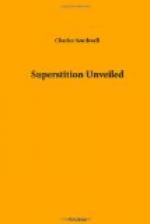These definitions conceded accurate, the conclusion that neither cause nor effect exist, seems inevitable, for change of being is not being itself any more than attraction is the thing attracted. One might as philosophically erect attraction into reality and fall down and worship it as change which is in very truth a mere “matter of naming.” Not so the things changing or changed; they are real, the prolific parent of all appearance we behold, of all sensation we experience, of all ideas we receive, in short, of all causes and of all effects, which causes and effects, as shown by Mr. Lewis, are merely notional, for “we call the antecedent cause, and the sequent effect; but these are merely relative conceptions; the sequence itself is antecedent to some subsequent change, and the former antecedent was once only a sequent to its cause, and so on.”
Ancient Simonides, when asked by Dionysius to explain the nature of Deity, demanded a day to “see about it,” then an additional two days, and then four days more, thus wisely intimating to his silly pupil, that the more men think about Gods, the less competent they are to give any rational account of them.
Cicero was sensible and candid enough to acknowledge that he found it much easier to say what God was not, than what he was. Like Simonides, he was mere Pagan, and like him, arguing from the known course of nature, was unable, with all his mastery of talk, to convey positive ideas of Deity. But how should he convey to others what he did not, could not, himself possess? To him no revolution had been vouchsafed, and though my Lord Brougham is quite sure, without the proof of natural Theology, revelation has no other basis than mere tradition; we have even better authority than his Lordship’s for the staggering fact that natural Theology, without the prop of revelation, is a ’rhapsody of words,’ mere jargon, analogous to the tale told by an idiot, so happily described by our great poet as ’full of sound and fury, signifying nothing.’ We have a Rev. Hugh M’Neil ’convinced that, from external creation, no right conclusion can be drawn concerning the moral character of God,’ and that ’creation is too deeply and disastrously blotted in consequence of man’s sin, to admit of any satisfactory result from an adequate contemplation of nature.’ [42:1] We have a Gillespie setting aside the Design Argument, on the ground that the reasonings by which it is supported are ‘inapt’ to show such attributes as infinity, omnipresence, free agency, omnipotency, eternality, or unity,’ belong in any way to God. On this latter attribute he specially enlarges, and after allowing the contrivances we observe in nature, may establish a unity of counsel, desires to be told how they can establish a unity of substance. [42:2] We have Dr. Chalmors and Bishop Watson, whose capacities were not the meanest, contending that there is no natural proof of a God, and that




